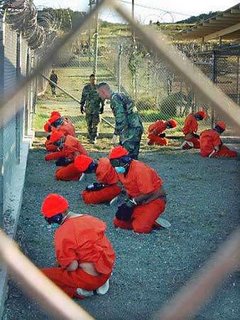 From NYT: The Bush administration called today for Congress to fix, rather than scrap, the system of military tribunals that was struck down by the Supreme Court last month, while the Pentagon pledged to treat detainees in accordance with the Geneva Conventions as the court required.
From NYT: The Bush administration called today for Congress to fix, rather than scrap, the system of military tribunals that was struck down by the Supreme Court last month, while the Pentagon pledged to treat detainees in accordance with the Geneva Conventions as the court required.***
Good. Finally. There'll be opposition to this for sure from the wackos on the right, but I think this is a great move. The U.S. has engaged in some pretty despicable things in the wake of 9-11 and it's time to set things right. The horrific, infuriating events of that day shook up our value system and forced our government to enforce reactionary policy that has sparked our latent culture war.
We're five years into this mess and it's time to stop acting out of fear and invest in long-term initatives that will weed out terrorists, prosecute them, and send a clear message of cooperation to the international community. To yank suspects from their homes and families, with no idea of when they'll be tried and with no access to representation is beyond reprehensible. We've afforded child murderers and rapists more respect even after they confess to their crimes than we do people whose language we can't even understand.
4 comments:
OK GCL, I like where you're coming from and respect the effort you are making vis-a-vis this blog. But you should make some effort at consistency. Like me, you say don't like it when the US govt "yank(s) suspects from their homes and families, with no idea of when they'll be tried and with no access to representation". And earlier you said how much further along Columbia would be if not for the Marxist insurgency. But then the whole, hmmmmm..... then you...ugh...the whole Castro thing. A monkey could have ruled better. I know Castro is an icon of the Liberal Establishment, but seriously, we get it...he's successfully stuck his finger in America's eye. But beyond that, there has been no practical advantage to Cuba as a whole.
My point is, if you are against the Bush detainee policy on people we picked up on a battle field, you should be against it on citizens listening to Radio Miami.
Let's clear something up: I think Castro is a pig. I think what he's done to Cuba is despicable. However, for all the coercion and intimidation his regime has imposed on the country, it can't be denied that many people, like Americans today who are so quick to support the Patriot Act, are all for Castro and have allowed him to stay in power.
The Soviet Union and the entire Eastern Bloc caved because its citizens said "Enough..." Once the Cubans who are still in the country say "enough," we'll see change. It's happening in Colombia, and it can happen in Cuba.
OK, don't hate me, but, sadly, :( I must quibble. It was not the 'People' who freed themselves from the SovUn, it was the SovUn who freed them by refusing to use their monopoly on terror and death. Sure, there were People's Movements behind the Iron Curtain, but they were always put down brutally. Gorbachev would not 'let' the Eastern dictatorships use force to stop these movements, so they collapsed. But when a dictator, such as Castro or Saddam remain in power, it is not so much an indication of the'Peoples' desire to keep them here so much as the Dictator's willingness to use their monopoly on terror to stay there. By the 90's, the Politburo in the SovUn came to realize that was no way to run a country.
And, yes, there are always those who go along. Just like Occupied France, or the mobs in Rome placated by the Roman Circus and public executions. That does not mean they have any legitimacy.
But otherwise your point is taken.
So brytta thinks a Cuban government is more willing to use the monopoly of terror than the old Soviet Union?
Well, if you say so.
But the key is perhaps neither the 'people' nor the 'government' but the middle level mangagers of violence: the military and police officers. In totalitarian regimes like N Korea they are both isolated and coddled, in other societies they have been recruited from either outsiders to mainstream society or from foreigners (like the Scythian police of old Athens).
During the Tienanmen Square repression the gov't took enforcement functions away from the Beijing garrison (urbanites speaking the local language) and brought in tough young peasant soldiers from distant parts of China. They had fewer emotional problems when given the order to fire.
My impresson is Cuba is not like that, for a number of reasons.
Post a Comment